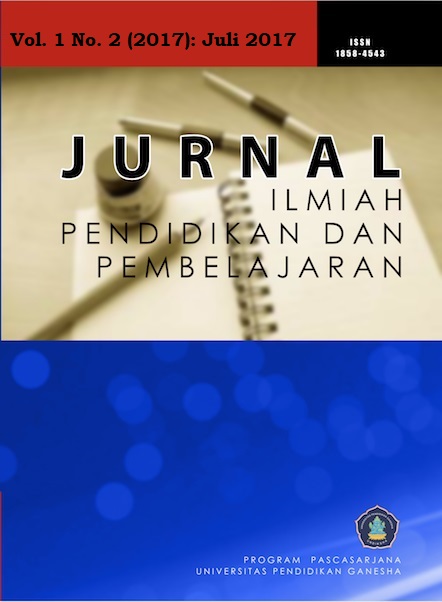PENGARUH MODEL PEMBELAJARAN CREATIVE PROBLEM SOLVING BERBASIS EDUCATIVE GAMES TERHADAP KEMAMPUAN BERPIKIR KRITIS DAN HASIL BELAJAR IPA KELAS IV DI GUGUS IV KECAMATAN KUTA, KABUPATEN BADUNG
DOI:
https://doi.org/10.23887/jipp.v1i2.11967Abstract
Penelitian ini bertujuan untuk mengetahui pengaruh model pembelajaran Creative Problem Solving berbasis Educative Games terhadap kemampuan berpikir kritis dan hasil belajar IPA kelas IV di Gugus IV Kecamatan Kuta, Kabupaten Badung. Penelitian ini adalah penelitian kuasi eksperimen dengan rancangan post test only control group design. Jumlah populasi dalam penelitian ini adalah 231 siswa, dan sampel berjumlah 77 siswa. Data kemampuan berpikir kritis dan hasil belajar IPA dikumpulkan dengan metode tes. Analisis data yang digunakan yakni Manova berbantuan SPSS 17.00 for windows. Hasil Penelitian menunjukkan bahwa: 1) terdapat perbedaan kemampuan berpikir kritis antara siswa yang mengikuti model pembelajaran creative problem solving berbasis Educative Games dengan siswa yang mengikuti pembelajaran konvensional, 2) terdapat perbedaan hasil belajar IPA antara siswa yang mengikuti model pembelajaran creative problem solving berbasis Educative Games dengan siswa yang mengikuti pembelajaran konvensional, dan 3) terdapat perbedaan secara simultan antara kemampuan berpikir kritis dan hasil belajar IPA antara siswa yang mengikuti model pembelajaran creative problem solving berbasis Educative Games dengan siswa yang mengikuti pembelajaran konvensional.Downloads
Published
2017-10-04
How to Cite
Yanti, N. L. M. S. M. (2017). PENGARUH MODEL PEMBELAJARAN CREATIVE PROBLEM SOLVING BERBASIS EDUCATIVE GAMES TERHADAP KEMAMPUAN BERPIKIR KRITIS DAN HASIL BELAJAR IPA KELAS IV DI GUGUS IV KECAMATAN KUTA, KABUPATEN BADUNG. Jurnal Ilmiah Pendidikan Dan Pembelajaran, 1(2). https://doi.org/10.23887/jipp.v1i2.11967
Issue
Section
Articles
License
Authors who publish with the Jurnal Ilmiah Pendidikan dan Pembelajaran (JIPP) agree to the following terms:
- Authors retain copyright and grant the journal the right of first publication with the work simultaneously licensed under a Creative Commons Attribution License (CC BY-SA 4.0) that allows others to share the work with an acknowledgment of the work's authorship and initial publication in this journal.
- Authors are able to enter into separate, additional contractual arrangements for the non-exclusive distribution of the journal's published version of the work (e.g., post it to an institutional repository or publish it in a book), with an acknowledgment of its initial publication in this journal.
- Authors are permitted and encouraged to post their work online (e.g., in institutional repositories or on their website) prior to and during the submission process, as it can lead to productive exchanges, as well as earlier and greater citation of published work. (See The Effect of Open Access)










